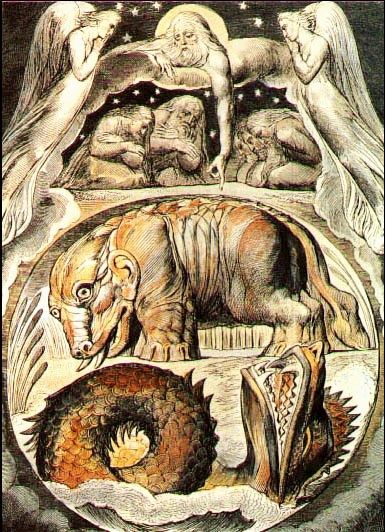Nature and the Common Good
By Joseph Milne
Modern economic thinking generally takes for granted an unavoidable conflict between the common good and the individual good, as though the two ends were somehow incompatible. Thus the interest of the employee is seen as in conflict with the interest of the employer, the customer’s in conflict with the seller’s, or the tax payer’s in conflict with the general welfare of the nation. The same holds on the social and political levels. One interest always seems to be at the expense of another.
This conflictual view of society can be traced back to the mechanistic analysis of nature elaborated by Thomas Hobbes, reinforced by the social Darwinism of the nineteenth century, and continuing in evolutionists such as Richard Dawkins in The Selfish Gene. According to these views, despite any other differences between them, ‘nature’ is made up of separate entities each competing to secure a foothold in the environment. This atomistic and competitive view of nature contrasts sharply with the classical view in which nature is conceived as a harmonious whole where everything has its due place and contribution to make in the overall scheme of things. In the classical view, society is part of nature. This is the view of Plato and Aristotle, whom the seventeenth century philosophers dismissed as unrealistic and impractical. Given the new atomistic view of nature, political society is consequently conceived as an artificial organisation imposed upon a pre-political ‘state of nature’, with its laws devised to curb the natural human inclination to selfishness. In this view the human person is neither naturally social nor willingly cooperative.
It is important to observe that this atomistic view of human society, which reduces nature to a mere struggle for existence, was propagated in direct opposition to the classical view of society, as found in Plato, Aristotle, Cicero and the tenets of Roman law, all which held that the human species was naturally social and political. Hobbes, followed by Locke and Rousseau, each argue that society is an unnatural condition, and that every person in the pre-political ‘state of nature’ is naturally solitary and self-sufficient. It is merely fear and necessity that has forced human society into existence. Thus, ruled not by any concern for the common good, but by the instinctive fear of death, the modern ‘private individual’ emerged, only pragmatically social, and individual rights conceived as in conflict with the common good, or as protecting the individual from the power of the state. It is on this basis that society and all human relations are reduced to competitive commerce, each individual struggling for his own personal gain in ‘enlightened self-interest’. Thus the foundations are laid to view economics as a machine devoid of any moral dimension, and the aim of human life as nothing else than the endless pursuit of property.
It hardly needs to be said that such a view is wholly contrary to how Henry George conceived the natural laws that govern society, as well as his understanding of human nature. It is a view that has grown out of the separation of civil society from nature, and justice from the natural order of the universe. For if the ‘state of nature’ is lawless and warlike, and the rise of society merely a defence against the brutality of nature, then it follows that there can be no natural relation between society and the earth, any more than there can be a natural relation between the individual and society. Justice itself can only be an artificial construct, and certainly not to be observed in the natural order of things.
Given these presuppositions, it is no wonder that modern economic theories fail to see that the economic rent belongs to the community and cannot justly be claimed by any private individual or company. If there is no natural relation between civil society and the earth, and if society exists essentially for the good of the self-interested individual, and if the aim of society is the pursuit of property, then the earth or anything else may be claimed as privately owned, either by individuals or by factions. And what may be said of physical property may also be said of intellectual property. There is no natural division of wealth nor natural sharing of the earth in the atomistic theory of society propagated in the seventeenth century in opposition to the classical conception of the natural society.
Even though George engages with Hobbes and Locke and the other modern economists of his time, his vision is essentially that of the classical philosophers. Like them, he saw that in nature everything was lawfully connected with the whole. And so for him the economic rent is the spontaneous fiscal manifestation of the common benefit which arises naturally through social cooperation. It is a manifestation of the natural integrity of civil society. It demonstrates that humanity is more human in community than as isolated individuals. If this natural benefit is misappropriated, then the whole structure of society and its institutions become distorted and cannot function well, while alternative tax systems are burdensome and invite corruption. Then the Hobbesian analysis appears to be right and there seems to be little alternative but to attempt to mitigate all consequent social and economic evils so far as possible by the strong imposition of the law of the ruler, while justice itself remains only a utopian dream. But if a society fails to perceive an injustice that runs contrary to the very nature of society itself, and thus contrary to human nature, then even well intentioned remedies will inevitably flounder or even introduce further injustices.
In all his writings George’s aim was to call society to reflect upon itself and to perceive its own nature, and through this refection to see justice and through that knowledge to remedy injustice. In this sense George does not present an ideology, as Marxism does. George saw that to understand the real nature of society involves grasping the immediate correspondence between nature and ethics, or between the natural law and the common good. This he understood to be the proper purpose of the study of political economy. From this perspective, the trading of goods is but one aspect of human exchange and not in itself the essential purpose of society. Ultimately all exchange has a moral purpose.
 Modern social and political theories do not see this correspondence between the natural and the ethical. On the contrary, they assume that what each individual naturally desires is in some sense at the expense of the whole, or regardless of the whole. Any kind of altruism is considered to be unrealistic or even a threat to personal freedom. From this perspective it inevitably follows that laws will need to be made that can mediate between the individual and the general good. This is the presupposition of recent human rights theory, where society and the individual are regarded as making competing claims upon one another which need to be arbitrated through legal process. Law thus conceived, as a means of resolving inherent conflicting interests, is a degenerate conception of the nature of law. As Simone Weil observed, it reduces the human person into a legal entity. Natural justice cannot be in conflict with itself, as though there were one justice for the individual and another for the community as a whole.
Modern social and political theories do not see this correspondence between the natural and the ethical. On the contrary, they assume that what each individual naturally desires is in some sense at the expense of the whole, or regardless of the whole. Any kind of altruism is considered to be unrealistic or even a threat to personal freedom. From this perspective it inevitably follows that laws will need to be made that can mediate between the individual and the general good. This is the presupposition of recent human rights theory, where society and the individual are regarded as making competing claims upon one another which need to be arbitrated through legal process. Law thus conceived, as a means of resolving inherent conflicting interests, is a degenerate conception of the nature of law. As Simone Weil observed, it reduces the human person into a legal entity. Natural justice cannot be in conflict with itself, as though there were one justice for the individual and another for the community as a whole.
Economically speaking, it is clear that these assumed inescapable conflicts arise primarily through the misappropriation of the natural revenue created spontaneously by the community. Or, to put that another way, through the failure to observe that ‘nature’ cannot be made private property without distorting human exchange and causing poverty. It is this initial economic injustice that gives rise to all subsequent economic injustices, and these injustices come to be accepted as the norm, which in turn tend to conceal the primary injustice, and so society conceives itself as unavoidably in conflict with itself. Thus injustice comes to be accepted as part of the natural state of things.
Given this state of affairs it becomes very difficult to see how the natural state of society and the ethical can correspond with one another as George proposes. Yet to see this correspondence is precisely the true challenge of the study of political economy. It is also the challenge of society itself, insofar as we are social and political beings able to reflect on the order of things. There is an intellectual natural law, as George clearly observed in Social Problems, that human society can flourish only so far as it understands itself in relation to the universal laws of nature, or universal justice. It is the capacity to perceive and understand these laws that distinguishes humanity from the other species, and not the irrational fear of death as Hobbes claims in his conception of the state of nature. In the classical tradition, which the philosophers and economists of the seventeenth century opposed through a blind belief in mechanical science, it is their potential that defines the nature of things, not their historical origins or mechanistic forms. It is the ripe apple which defines the apple, the oak tree that defines the acorn, and the just society that defines humanity. It is the difference between a noble or a barbaric conception of human nature. George clearly holds a noble conception of human nature and so glimpses the potential of society, and it is this that reveals the correspondence between nature and the ethical.
We can get an indication of this correspondence from a passage in George’s The Science of Political Economy where he writes:
All living things that we know cooperate in some kind and to some degree. So far as we can see, nothing that lives can live in and for itself alone. But man is the only one who cooperates by exchanging, and he may be distinguished from all the numberless tribes that with him tenant the earth as the exchanging animal. Of them all he is the only one who seeks to obtain one thing by giving another. (p. 399)
Here George clearly echoes the classical vison of society. That nothing lives for itself alone was a fundamental insight of the ancient Stoics as we see in the writings of Cicero:
For our individual natures are parts of the whole cosmos. And this is why the end may be defined as life in accordance with nature, or in other words, according to our own human nature as well as that of the cosmos, a life in which we refrain from every action forbidden by the law common to all things, that is to say, the right reason which pervades all things, and is identical with this Zeus, lord and ruler of all that is. (Cicero, De Finibus)
If he had known it, George would surely have approved this passage from Cicero – a passage, by the way, that utterly contradicts the thesis of Hobbes and the general outlook of the seventeenth and eighteenth century philosophers and economists.
George argues in The Science of Political Economy that cooperative exchange is the first law of economic production, and should not be equated with the laws of distribution. Human society, he says, is distinguished from the mode of life of all other creatures by cooperative exchange. The human individual is human, even at the most basic level, by virtue of this capacity for cooperative exchange. This implies that each person within society has the gifts or talents to create or provide what others need or desire, and the desire and capacity to enjoy what others create from their gifts or talents. The law of cooperative exchange is thus proportionate in giving and receiving – in a word, it is just. And here justice produces more for each than each could have alone. The law of cooperative exchange assumes there is a general correspondence between natural human talents, the creation of wealth or rendering of service, and the ethical. Indeed, they mutually sustain one another. Justice in exchange is the most obvious manifestation of economic justice. It is justice in exchange that creates society.
The only way in which this natural cooperative exchange can become unjust is where one party steals from another, or forces an unwilling exchange, or prevents the cultivation or application of natural human talents and vocations. In short, so long as this cooperative exchange is open and free it is just for every individual and innately serves the common good. It is naturally ethical, and so no laws or rights need to be imposed from outside to secure justice. Any good laws that might be framed are already fully present and operative in the act of exchange itself, and such implicit or inherent laws and rights are what has traditionally been called the natural law. The natural law is the law active in nature itself, “the right reason which pervades all things” as Cicero describes it, and requiring only rational recognition. It is only in forgetfulness of this law that conventional or positive laws need to be enacted.
This cooperative exchange includes all material economic activity without exception. But it also includes intellectual and cultural exchange. A Michelangelo or a Shakespeare arise through cultural cooperative exchange and continue to contribute to the common good far beyond their own lives. In a remarkable way the greatest individual exchanges become the common property of a society, or even a whole civilization. Inventions or discoveries are obvious examples. Nature orders society naturally to common benefit across generations. Indeed, the common good often gets served despite the selfish desires of individuals. Nature looks first to the whole and only secondly to the part, and human reason itself corresponds with this in its natural inclination to understand the nature of things.
In this simple analysis of the human economy it is evident that so long as no injustice interferes with the natural human desires and talents, which are by nature oriented towards community where alone they may flourish, the common good is served freely. There is no division between individual desire and the common good where desire is natural. Yet, as the classical philosophers held, the common good is mother of the individual good and not the reverse. The individual is an individual only by virtue of being part of the greater whole, and so it is only through grasping the good of the greater whole that the good of the individual may be properly observed or realized.
Something further is also shown here. The meaning of ‘work’ as we usually think of it is transformed, or rather we should say recovered, once it is understood that cooperative exchange is the natural condition of all human endeavour. Because of the underlying injustices imposed upon the present economy, which severely distorts just exchange, work ceases to be the natural expression of human talents and creativity and becomes for most people a burden wearing down the human spirit. For vast numbers of people work is reduced merely to a means of warding off poverty instead of being the natural fulfilment of human gifts or vocations. Labour gets forced to unnatural ends, producing things harmful to society as well as to the environment. At best work merely secures an ‘income’ rather than being a meaningful activity in its own right. Consequently it degenerates into a breeding ground for non-productive speculation, usury and every kind of exploitation.
So when work becomes oppressive and unfulfilling it breaks the natural link between ethics and the common good. Thomas Aquinas says, “Man cannot possibly be good unless he stands in the right relation to the common good”. In Christianity there is no good separate from the universal good. But a society can stand in the right relation to the common good only insofar as it comprehends the natural laws that manifest in the real relations between its members. If these relations appear to be in conflict with one another, as they clearly do in our times, then an underlying injustice must be distorting exchange, since the individual good and the common good cannot naturally be at variance with one another. But if a society fails to understand the natural laws of cooperative exchange and unwittingly permits a general injustice to violate those laws, then it will come to accept injustice as natural and at best seek to mitigate its harmful consequences. Economics and ethics will remain disconnected from one another and neither will attain its proper end. It is therefore incumbent on society to seek to understand its place in the order of nature and to discern the natural laws that govern it.
It is therefore necessary to challenge the presuppositions and methods of modern economic thinking and to free it from the reductive mechanistic pseudo-science of the seventeenth century. It is really quite astounding to realize how the barbaric assumptions of social philosophers such as Hobbes and Locke still prevail in our times while we pride ourselves on our investigations of human nature and society.




